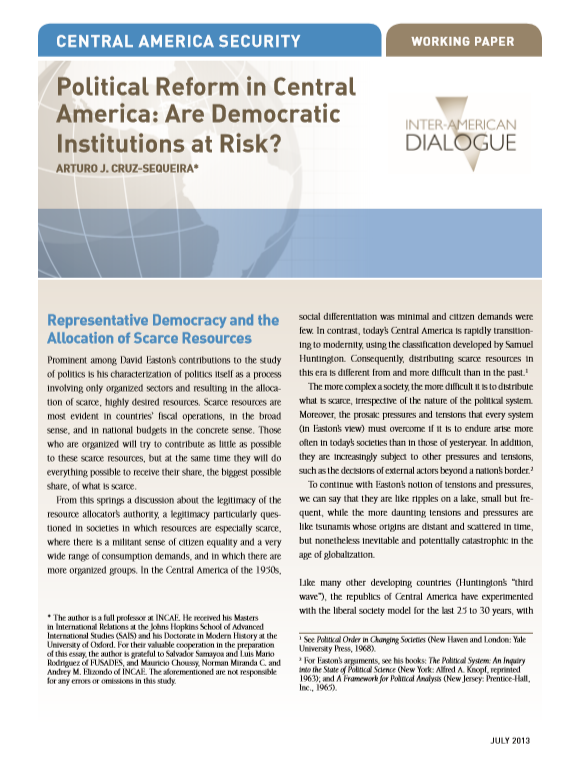Can Spain Solve the Cuba Problem?
By all accounts, Spain wants to bring change to the European Union’s Cuba policy. In so doing, it is tackling a foreign policy challenge that often sheds more heat than light.
The Inter-American Dialogue is pleased to publish this study by Arturo J. Cruz-Sequeira, Nicaragua’s former ambassador to the United States and a professor at INCAE Business School in Costa Rica and Nicaragua. Our aim is to stimulate a broad and well-informed public debate on complex issues facing analysts, decision makers, and citizens concerned about Latin America’s policy agenda.
The study was originally prepared in Spanish at the request of the Salvadoran Foundation for Economic and Social Development (FUSADES) and presented at the organization’s International Forum for Political Analysis (FIAP) in April 2013. This annual event, sponsored by FUSADES’ Department of Political Science, brings together top political scientists from some of the most recognized universities and think tanks in the world.
In this working paper, Cruz offers a fresh and original assessment of the state of democratic governance in five Central American nations: Nicaragua, Costa Rica, Honduras, El Salvador, and Guatemala. Using economic and political data, Cruz shows how the interplay between each country’s civil society, political society, and government shapes its democratic development in the context of intensified citizen demands coupled with diminished US assistance. While results vary from country to country, Cruz finds each state still struggling to strike a balance between its capacities and citizen expectations. Cruz observes these young democracies regressing along two troubling trajectories—either towards clientelism under a dominant ruler, as in the case of Nicaragua, or towards weak pluralism devoid of party stability, as in the case of Costa Rica.
This working paper is part of a series of studies carried out as part of the Dialogue’s initiative on security and migration in Central America and Mexico. The project works with leading think tanks, research centers, and independent journalists in Mexico and Central America on these two pressing policy challenges. Our work seeks to influence the policy and media communities in the United States, Mexico, and the nations of Central America; introduce Mexican and Central American viewpoints into policy debates and discussions in Washington; and promote fresh, practical ideas for greater cooperation to address security and migration challenges.
This major Dialogue initiative has organized three important meetings—in Washington, Guatemala, and Managua—and launched a web portal (ESP) to serve as a clearinghouse of data, analysis, legislation, and other resources related to security in Central America. This online tool promotes debate and cooperation, and supports research, advocacy, and policymaking efforts on pressing issues such as organized crime, gangs, criminal justice, and citizen security in Central America.
We are pleased to recognize the generous assistance provided by the Tinker Foundation and FUSADES for the production of this paper.
By all accounts, Spain wants to bring change to the European Union’s Cuba policy. In so doing, it is tackling a foreign policy challenge that often sheds more heat than light.
When Haiti was struck by a devastating earthquake, the administration of U.S. President Barack Obama quickly absorbed the depth of the tragedy and necessity of a robust U.S. response. Unless the U.S. adopts a proactive role, Haiti’s fragmented political landscape threatens to deteriorate into a political vacuum that will compound the current crisis.
Politics is swirling everywhere. Such are the ways of democracies, especially when oppositions come alive and defeat or threaten incumbents.
